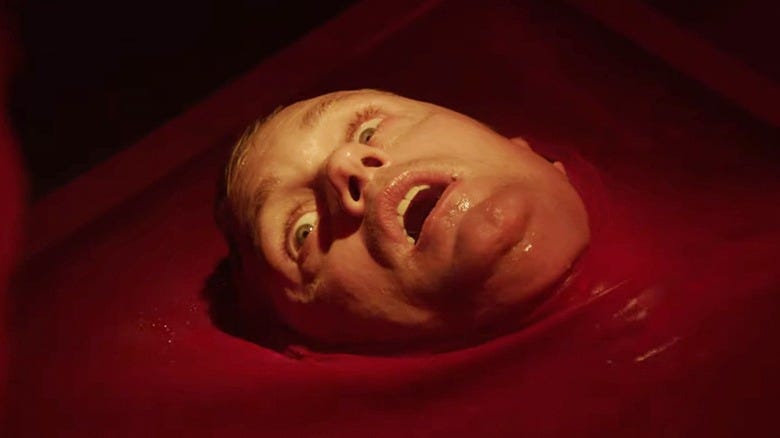Stay Out of the Infinity Pool
Brandon Cronenberg crafts a pompous colonialist mediocrity.
Brandon Cronenberg’s The Infinity Pool believes that showing rich people behaving badly is an exercise in moral seriousness, especially if you have an ominous soundtrack in the background. Unfortunately, it is not—no not even if you throw in a bunch of Jungian bullshit, alas.
The rich person behaving badly is semi-failed novelist James Foster (Alexander Skarsgård) who is visiting the fictional country of Li Tolqa with his wealthy wife Em (Cleopatra Coleman). The two meet Gabi (Mia Goth) and her husband Alban (Jalil Lespert) who say they are fans of James first book. They invite the Fosters out for a picnic in the countryside; on their way home, James hits a farmer and kills him. They are arrested and James is condemned to death—unless he pays for the creation of an exact duplicate, who can be executed in his place. James so pays, watches his double get executed, and the experience sends him into a spiral of hedonism; he separates from his wife, and pursues sex, drugs, and ugly native face masks with Gabi. Eventally, he has to kill his other self, like Luke in The Empire Strikes Back, but without the redeeming feature of Yoda.
The plot here is basically the same as The Forgiven from 2021, in which Ralph Fiennes, vacationing in Morocco, hits and kills a young men in the road. The Forgiven isn’t a great movie, but it does make some effort to actually engage the issues of colonialism and violence that it raises. We see the grief of the family of the boy that Fiennes’ character kills, and the movie talks about and shows the dynamics of poverty and tourism which lead to exploitation and violence. The white, wealthy protagonists don’t have to be monsters for their impact to be monstrous; they just have to be focused (like the movie) on themselves.
The Infinity Pool doesn’t have anything like that level of honesty or insight. The dead farmer’s family isn’t shown grieving him; instead, we watch his 13-year-old son murder the James double with a knife. The people of Li Tolqa barely exist outside their magic rituals, hallucinogenic drugs, and apparent barbarity—a barbarity which entraps and corrupts. The dynamic here is much less like that in The Forgiven, where wealthy tourists are embedded in relationships of inequality and cruelty, and much more like that in Heart of Darkness—where the problem with colonialism is that spending time in the colonies supposedly corrupts good upstanding Westerners.
Mia Goth is fun to watch in the role of hyper-sexual seductive corrupting termagent (a misogynist stereotype to round out the colonial ones), but Skarsgård isn’t very responsive or interesting. He starts off as a boring slab, and as he descends into iniquity, he’s still a boring slab, just more rumpled. Cronenberg tries to heighten the tension with standard issue psychedelic sequences, involving color shifts and naked breasts. Early in the film he turns the camera upside down to show you that the moral order is upended out here in this foreign nation that isn’t North America. Get it?
This is the first film of the younger Cronenberg’s I’ve seen, and it’s not a felicitious introduction; he appears to have all of his dad’s weaknesses (a crushing self-seriousness, a cowardly refusal to address his own queer themes) without his gift for odd structure and body horror imagery. If you want to see talented directors take Videodrome and Naked Lunch to new and wonderful places, go see the marvelous Titane or You Won’t Be Alone. As an extension of the Cronenberg legacy, though, Infinity Pool is a shallow, damp squib.


